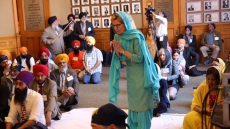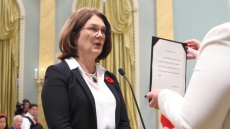OTTAWA — NDP Leader Tom Mulcair is joining the chorus urging the federal government to refer its proposed new law on medical assistance in dying to the Supreme Court.
Mulcair says he'll vote for the bill because he believes Parliament should meet the June 6 deadline set by the top court for enacting a new law.
But he says there are "shortcomings" in the restrictive approach the government is taking, raising legitimate questions as to whether it respects the top court's ruling last year, which struck down the ban on assisted dying.
Mulcair says the simplest way to remove doubt is to refer the law to the Supreme Court to test whether it complies with the ruling and with the charter of rights.
A number of advocacy groups, as well as some MPs and senators, are also urging the government to seek the top court's advice on the new law, rather than force sick or dying individuals to launch court challenges on their own.
Justice Minister Jody Wilson-Raybould has said it's "premature" to consider a court reference and Prime Minister Justin Trudeau does not seem inclined to seek the court's advice on the matter.
"To remove all doubt for families, for medical practitioners and for parliamentarians, I think that the government should today say we will be referring this to the Supreme Court," Mulcair said following an NDP caucus meeting Wednesday.
"We (would) get a rapid decision and everybody would have a much more solid footing."
The Supreme Court ruled that medical help in dying should be available to clearly consenting adults with "grievous and irremediable" medical conditions who are enduring physical or mental suffering that they find intolerable.

The government has taken a more restrictive approach, allowing assisted death only for consenting adults, at least 18 years of age, who are in "an advanced stage of irreversible decline" from a serious and incurable disease, illness or disability and for whom a natural death is "reasonably foreseeable."
The proposed law does not extend the right to medically assisted dying to mature minors or to those who suffer only from mental illnesses. Nor does it allow people with competence-eroding conditions like dementia to make advance requests for an assisted death.
Trudeau acknowledged Tuesday that the bill dodges some of the more difficult issues, but he said legalizing medically assisted dying is a huge change for Canada and needs to be done slowly, one step at a time.
Issues such as mature minors and advance directives will eventually be dealt with, hopefully by Parliament rather than the courts, he added.
"I hope we don't have to wait on the Supreme Court to make these decisions," Trudeau said during a question and answer session with University of Ottawa students.
"I hope we as Canadians and as parliamentarians are able to have these difficult but reasonable discussions on making sure that we're doing right by everyone's rights while we protect the most vulnerable."

Conservative MP Andrew Scheer said his party wants to strengthen provisions in the bill to protect the conscience rights of doctors and nurses who do not want to participate in helping patients die.
Nothing in the bill compels medical practitioners to take part but nor does it specifically affirm their right to refuse. How precisely that will work without limiting access to medical help in dying is left to the provinces, which are responsible for delivering health care, to figure out.




